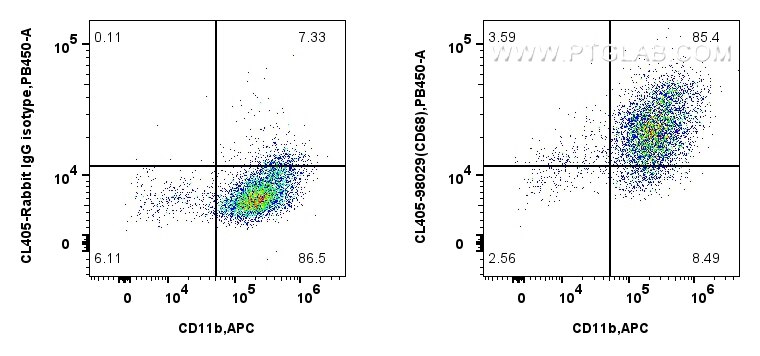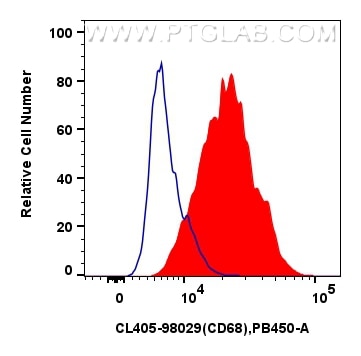Anticorps Recombinant de lapin anti-CD68
CD68 Recombinant Antibody for FC (Intra)
Hôte / Isotype
Lapin / IgG
Réactivité testée
souris
Applications
FC (Intra)
Conjugaison
CoraLite® Plus 405 Fluorescent Dye
CloneNo.
230504G5
N° de cat : CL405-98029
Synonymes
Galerie de données de validation
Applications testées
| Résultats positifs en FC (Intra) | macrophages péritonéaux de souris, |
Dilution recommandée
| Application | Dilution |
|---|---|
| This reagent has been tested for flow cytometric analysis. It is recommended that this reagent should be titrated in each testing system to obtain optimal results. | |
| Sample-dependent, check data in validation data gallery | |
Informations sur le produit
CL405-98029 cible CD68 dans les applications de FC (Intra) et montre une réactivité avec des échantillons souris
| Réactivité | souris |
| Hôte / Isotype | Lapin / IgG |
| Clonalité | Recombinant |
| Type | Anticorps |
| Immunogène | Protéine recombinante |
| Nom complet | CD68 antigen |
| Masse moléculaire calculée | 35 kDa |
| Numéro d’acquisition GenBank | NM_001291058.1 |
| Symbole du gène | Cd68 |
| Identification du gène (NCBI) | 12514 |
| Conjugaison | CoraLite® Plus 405 Fluorescent Dye |
| Excitation/Emission maxima wavelengths | 399 nm / 422 nm |
| Forme | Liquide |
| Méthode de purification | Purification par protéine A |
| Tampon de stockage | PBS with 0.09% sodium azide |
| Conditions de stockage | Store at 2-8°C. Avoid exposure to light. Stable for one year after shipment. |
Informations générales
Mouse CD68 (also known as macrosialin) is a type I transmembrane glycoprotein that is highly and specifically expressed by mouse tissue macrophages, and to a lesser extent by dendritic cells. It belongs to the lysosomal/endosomal-associated membrane glycoprotein (LAMP) family and primarily localizes to lysosomes and endosomes with a smaller fraction circulating to the cell surface. CD68 is also a member of the scavenger receptor family. It may play a role in phagocytic activities of tissue macrophages.
Protocole
| Product Specific Protocols | |
|---|---|
| FC protocol for CL Plus 405 CD68 antibody CL405-98029 | Download protocol |
| Standard Protocols | |
|---|---|
| Click here to view our Standard Protocols |



